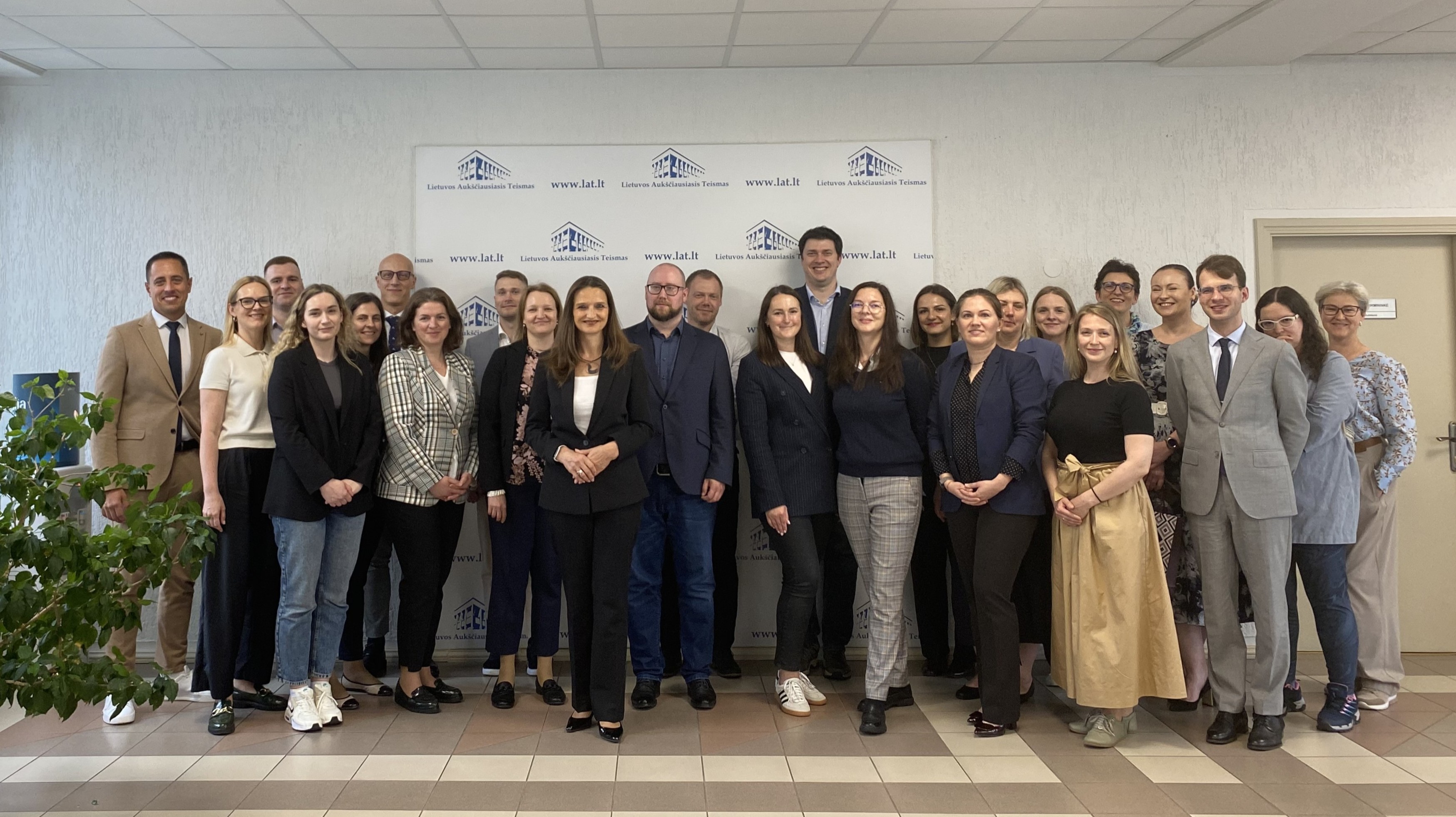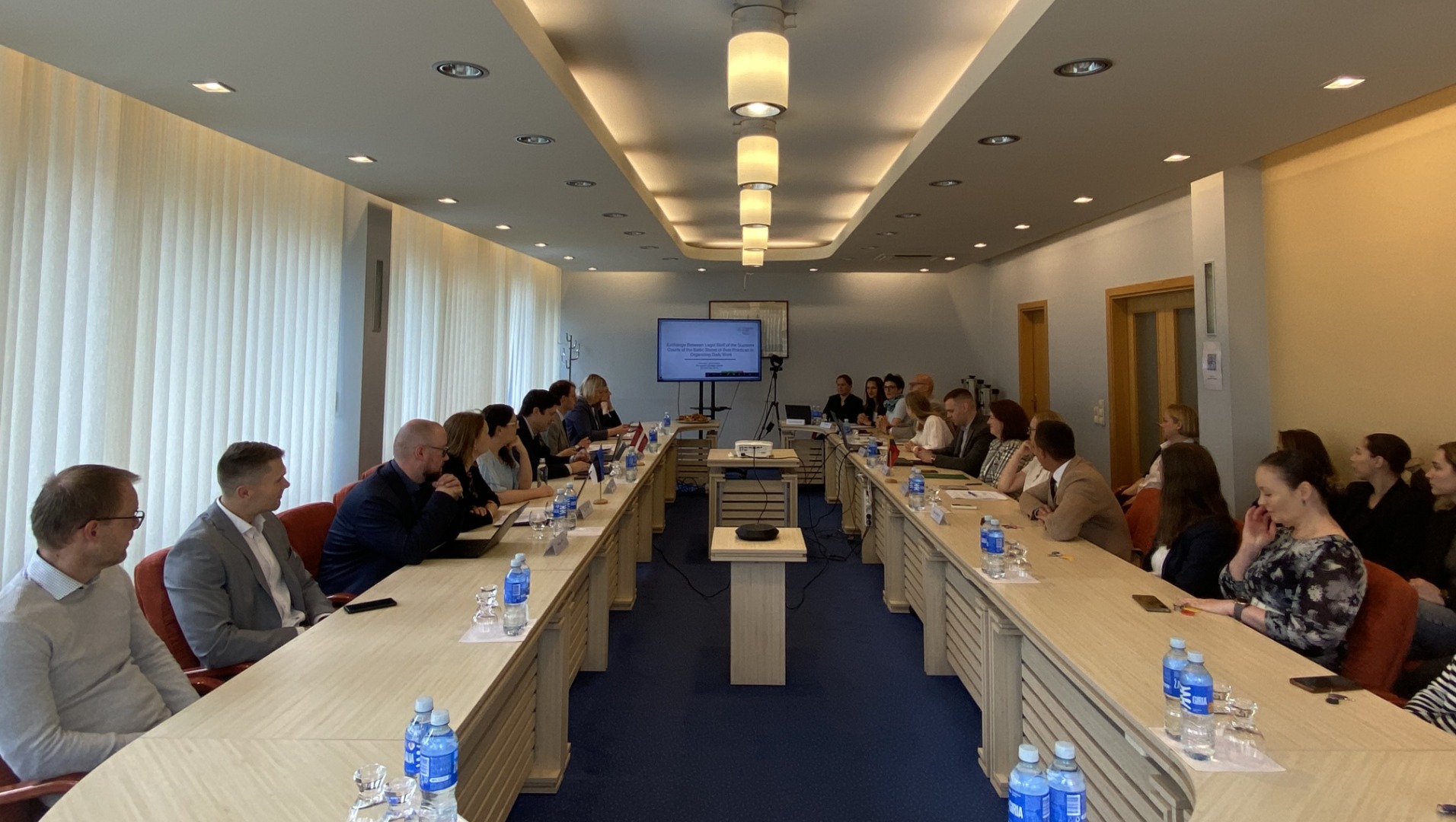Meeting of representatives of Baltic Supreme Courts in Vilnius: experience exchange and discussions on digitalization in court work
25 June, 2025
On June 19 and 20, a meeting of advisers, judicial assistants and consultants of the Supreme Courts of the Baltic States took place at the Supreme Court of Lithuania. The participants shared their experiences and discussed issues related to the organisation of the work of advisers and judicial assistants, as well as the use of digital tools in court work.
On the first day, Lithuanian colleagues presented the work of the Supreme Court of Lithuania and its role as a court of cassation in the Lithuanian legal system. The Supreme Court of Lithuania is the court of cassation in civil and criminal cases, whose jurisdiction also includes adopting decisions on the reopening of administrative violation cases if, in adopting a court ruling, a material error in the application of substantive law or a significant violation of procedural law has been committed.
After visiting the Supreme Court of Lithuania, the participants went on an informative tour of the National Museum of Lithuania – the restored Palace of the Grand Dukes of Lithuania.
On the second day of the meeting, a conference of representatives of the Baltic Supreme Courts was held, which was organised in two discussion sessions. In the first session, “Role of Judicial Staff,” conference participants discussed the role of advisers, judicial assistants, and other court employees in ensuring the effective work of the Supreme Courts. As emphasized in the introduction to the conference by the President of the Supreme Court of Lithuania, Dr. Danguolė Bublienė – without people, Supreme Courts are nothing more than buildings. Alongside issues concerning the functions of judicial staff and the optimisation of work processes, other issues relating to improving the efficiency of the cassation court work were also discussed. During the discussion, participants acknowledged that in all the Supreme Courts of the Baltic States, great importance is attached not only to the legal quality of decisions and the speed of case examination, but also to the comprehensibility of decisions and the provision of information to the public about the decisions taken. With regard to ensuring the efficiency of the Supreme Court work, the participants in the discussion considered that the obligation to provide detailed reasons for refusing to initiate cassation proceedings could have a negative impact on the speed of adjudication of cases in cassation proceedings. Lithuanian and Estonian colleagues pointed out that their courts do not state the reasons for refusing to initiate cassation proceedings.
During the second discussion session, “IT tools, including AI,” the participants discussed the use of digital tools in the work of courts. Lithuanian colleagues presented the artificial intelligence tool TeDIA, developed by the Supreme Court of Lithuania in cooperation with Vilnius University which is used to prepare press releases. The pilot project for this tool was launched in January this year. Using this tool, judicial assistants upload anonymized court decisions, and the tool creates a draft press release, which is reviewed by a judicial assistant before publication. However, Lithuanian colleagues emphasized that manual review and refinement of the draft press release created by TeDIA is essential, especially in sensitive cases. Estonian colleagues, in turn, shared information about their electronic case management system and the fact that all activities related to case materials are carried out electronically.
Whereas, representatives of the Supreme Court of Latvia reported on a project for developing an artificial intelligence tool to help identify analogous incoming cases and select similar cases that have already been decided. The use of such a tool will help to ensure uniformity of case-law and promote respect for the principle of legal equality.
The participants agreed that it was a valuable opportunity to share experiences and a way to build closer cooperation between the Supreme Courts of the Baltic States.
The Supreme Court of Latvia was represented by Laura Vigupe, judicial assistant of the Department of Administrative Cases, Rihards Gulbis, legal research counsel of the Department of Civil Cases, and Germans Pavlovskis, assistant to the chair of the said Department, Kristīne Ivulāne, legal research counsel of the Division of Case-law and Research, and Tatjana Danmarka, judicial assistant of the Department of Criminal Cases. All employees of the Supreme Courts of the Baltic States were able to participate remotely in the conference.
Information prepared by judicial assistants and legal research counsels of the Supreme Court of Latvia
Contact information: Iveta Jaudzema, Communication specialist at the Supreme Court of Latvia
E-mail: iveta.jaudzema@at.gov.lv, telephone: +371 67020362
Photos by the Supreme Court of Ltihuania



